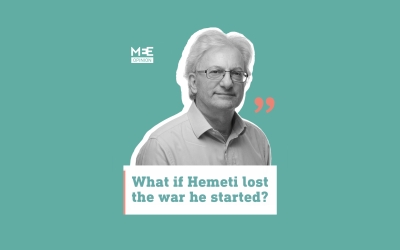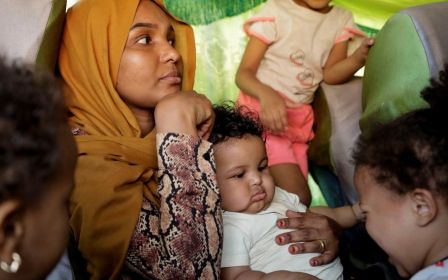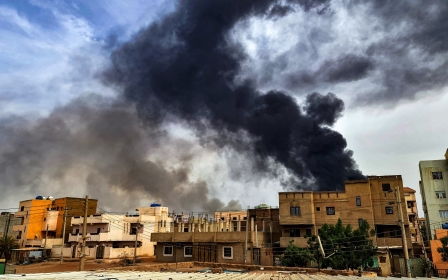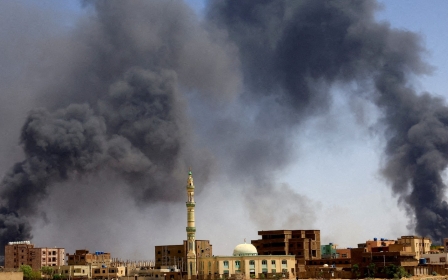Sudan: Ceasefire agreed as deadly air strikes pummel Khartoum

Sudan's warring factions have agreed to a new 72-hour ceasefire starting at 6am local time on Sunday, mediators Saudi Arabia and the United States said in a joint statement.
"The parties agreed that during the ceasefire they will refrain from prohibited movements, attacks, use of military aircraft or drones, artillery strikes, reinforcement of positions and resupply of forces, and will refrain from seeking military advantage during the ceasefire," the statement read.
Several truces have been agreed since the fighting began, but both sides have repeatedly violated ceasefire agreements.
Earlier on Saturday, air strikes killed or wounded more than two dozen civilians in Khartoum, as medics reported hundreds of wounded fleeing Sudan's western Darfur region in worsening violence of a two-month war.
The paramilitary Rapid Support Forces (RSF) claimed to have shot down a Sudanese army fighter plane. A military source, not authorised to speak to the press, told AFP anonymously that a plane did go down but blamed a "malfunction".
New MEE newsletter: Jerusalem Dispatch
Sign up to get the latest insights and analysis on Israel-Palestine, alongside Turkey Unpacked and other MEE newsletters
The army, commanded by Abdel Fattah al-Burhan, has since 15 April been battling the RSF, headed by his former deputy Mohamed Hamdan Dagalo, after the two fell out in a power struggle.
Witnesses say air strikes have intensified in the capital ahead of the latest ceasefire agreement.
On Saturday, warplanes again struck residential districts of Khartoum, killing "17 civilians, including five children", according to a citizens' support committee.
Residents had earlier reported air strikes around the city's southern Yarmouk district - home to a weapons manufacturing and arms depot complex where the RSF claimed "full control" in early June.
The citizens' committee added that 11 other civilians were wounded but Middle East Eye was not immediately able to independently confirm the committee's figures.
In a video published on Friday on the army's Facebook page, deputy army chief Yasser Atta warned civilians to keep away from houses where the RSF are located because the army could "attack them at any time".
Since battles began, the death toll across the country has topped 2,000, the Armed Conflict Location and Event Data Project said.
Hundreds of miles west of Khartoum, up to 1,100 have been killed in the West Darfur state capital El-Geneina alone, according to the US State Department.
Fleeing Sudan's Darfur
On Saturday, medics said that they were overwhelmed by the hundreds of wounded fleeing Sudan's Darfur region, which has become an increasing focus of global concern.
The dead have included West Darfur Governor Khamis Abdullah Abakar, killed after he criticised the paramilitaries in a Wednesday television interview. The RSF denied responsibility.
"We are overwhelmed in the operating theatre. We urgently need more beds and more staff," said Seybou Diarra, a physician and project coordinator in Adre, Chad, for the Doctors Without Borders (MSF) charity.
Wounded people were "coming in waves" to the hospital in Adre, just over the border about 12 miles west of El-Geneina, the MSF statement said.
More than 600 patients, most with gunshot wounds, arrived at the facility over a three-day period - more than half of them on Friday, the statement added.
Claire Nicolet, MSF's head of emergency programmes, cited "reports of intensifying and large-scale attacks this week".
According to the International Organisation for Migration (IOM), at least 149,000 people have fled from Darfur into Chad.
'Ominous reminder'
They are among the roughly 2.2 million people uprooted nationwide by the fighting, which has forced more than 528,000 to seek refuge in neighbouring countries, IOM said.
On Thursday, the State Department attributed the atrocities in Darfur "primarily" to the RSF and said the violence and alleged rights violations are an "ominous reminder" of the region's previous genocide.
A years-long war in Darfur began in 2003 with a rebel uprising that prompted then-longtime ruler Omar al-Bashir to unleash the Janjaweed militia, whose actions led to international charges of genocide, war crimes and crimes against humanity. The RSF have their origins in the Janjaweed.
Along with Darfur, Khartoum has seen the heaviest fighting.
On Saturday, residents of Khartoum reported gunfire from "various types of weapons", while witnesses also reported rocket and heavy artillery fire in the northern suburbs.
A record 25 million people - more than half the population - are in need of aid and protection, according to the United Nations, which says it has received only a fraction of the necessary funding.
Saudi Arabia has announced an international pledging conference for Monday in Geneva.
Middle East Eye delivers independent and unrivalled coverage and analysis of the Middle East, North Africa and beyond. To learn more about republishing this content and the associated fees, please fill out this form. More about MEE can be found here.





